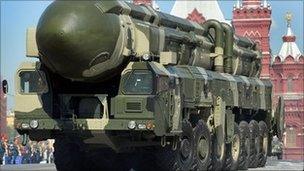Obama scores, but nuclear game not over
- Published

The treaty would substantially reduce deployed nuclear weapons on both sides
The ratification by the US Senate of the New Strategic Arms Reduction Treaty (Start), external with Russia is a boost for President Barack Obama, for US relations with Russia, and for the president's nuclear weapons agenda.
However, it still leaves major items on that nuclear agenda.
In addition, the manoeuvring that the White House had to engage in to slip it under the wire before the new Senate has its Democratic Party majority much reduced shows that the road ahead will be difficult.
First, though, the positives for President Obama:
Obama's standing
Mr Obama himself must be hoping that this and other agreements he has forged recently - over tax cuts and gays in the military - might begin a resurgence of his presidency leading to a second term.
He has at least got rid of one damaging comparison to the weak presidency of Jimmy Carter. In 1979, Mr Carter failed to get the Senate to ratify the Strategic Arms Limitation Talks (Salt II), external treaty. It was not entirely his fault - Russia, or rather the Soviet Union, had invaded Afghanistan.
But nothing succeeds for a president like success. Mr Carter lost. Mr Obama has won.
Relations with Russia
Nobody pretends that the so-called "New Start" treaty is going to save the world from the nuclear threat. It will reduce deployed warheads from 2,200 to 1,550 on each side - still plenty to destroy the world.
What it does do is to provide another building block of trust. And it enables verification, recalling Ronald Reagan's slogan: "Trust but verify." That is why the US military supported it.
Importantly, it also helps smooth the path towards Russian co-operation over current and future issues - Iran, access for Nato forces through Russia to Afghanistan and the development of anti-missile defences.
President Obama has made major moves towards Russia. He abandoned the missile defence plan and has now got the Senate on board for New Start. He will expect payback.
Nuclear agenda
Remember that President Obama looked towards a "world without nuclear weapons" in his speech in Prague in April 2009, external. It would not have looked very impressive if he had failed to get this relatively modest measure through his own Senate. But he has.
But it is indeed a start not an end.
It follows two other claimed successes - an agreement in Washington in April to help secure dangerous nuclear materials, and a conference in June to review the Nuclear Non-Proliferation Treaty (NPT), external. The first was reasonably practical, the second mostly words. There is more to do.
This brings us to the rest of the president's nuclear wish-list. This is not so easy. It is for:
US ratification of the Comprehensive Nuclear Test Ban Treaty (CTBT), external
A treaty to end the production of fissile material for use in nuclear bombs
An agreement with Russia on tactical nuclear weapons
CTBT
The US has signed it, but that means nothing without Senate ratification. In Prague, President Obama promised that he would "immediately and aggressively pursue" such ratification. There has been little sign of that.
And with the numbers moving against him in the Senate, it will be hard, though not impossible, to get it approved. Republicans are worried that a total ban on testing would leave the US nuclear arsenal unreliable and until technical measures are put in place to ensure otherwise, they will not budge.
Fissile material
A treaty, with verification measures, to end fissile material production was also promised in Prague. The fear of terrorists getting hold of this stuff is high. But first there has to be agreement on what defines fissile material and there is not. All highly enriched uranium or just beyond a certain level, for example? Then, Pakistan for one has been blocking progress, worried that its own ability to produce nuclear weapons might be compromised.
Tactical nuclear weapons
These short-range weapons emerged as a serious issue during the New Start debate, with opponents of the treaty complaining that it does not deal with them. The US is estimated to have about 500 deployed tactical nuclear weapons with a similar number in reserve. Russia is reckoned to have about 5000 in all, about 2000 of them deployed.
One problem is that if each side agrees to store them at home, Russia could deploy them in any war in Europe much more quickly.
A "world without nuclear weapons" is a long way off.
- Published23 December 2010